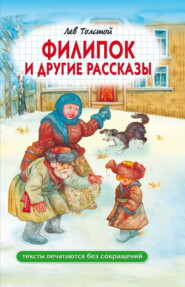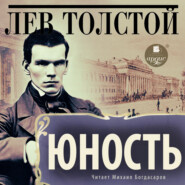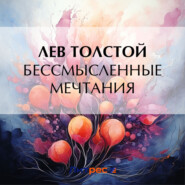По всем вопросам обращайтесь на: info@litportal.ru
(©) 2003-2025.
✖
Fables for Children, Stories for Children, Natural Science Stories, Popular Education, Decembrists, Moral Tales
Настройки чтения
Размер шрифта
Высота строк
Поля
We started to surround him, going through the dense pine forest. I was getting tired, and it was now much harder to travel. Now I would strike against a juniper-bush, and get caught in it; or a small pine-tree would get under my feet; or the snow-shoes would twist, as I was not used to them; or I would strike a stump or a block under the snow. I was beginning to be worn out. I took off my fur coat, and the sweat was just pouring down from me. But Demyán sailed along as in a boat. It looked as though the snow-shoes walked under him of their own accord. He neither caught in anything, nor did his shoes turn on him.
And he even threw my fur coat over his shoulders, and kept urging me on.
We made about three versts in a circle, and walked past the swamp. Demyán suddenly stopped in front of me, and waved his hand. I walked over to him. Demyán bent down, and pointed with his hand, and whispered to me:
"Do you see, a magpie is chattering on a windfall: the bird is scenting the bear from a distance. It is he."
We walked to one side, made another verst, and again hit the old trail. Thus we had made a circle around the bear, and he was inside of it. We stopped. I took off my hat and loosened my wraps: I felt as hot as in a bath, and was as wet as a mouse. Demyán, too, was all red, and he wiped his face with his sleeve.
"Well," he said, "we have done our work, sir, so we may take a rest."
The evening glow could be seen through the forest. We sat down on the snow-shoes to rest ourselves. We took the bread and salt out of the bags; first I ate a little snow, and then the bread. The bread tasted to me better than any I had eaten in all my life. We sat awhile; it began to grow dark. I asked Demyán how far it was to the village.
"About twelve versts. We shall reach it in the night; but now we must rest. Put on your fur coat, sir, or you will catch a cold."
Demyán broke off some pine branches, knocked down the snow, made a bed, and we lay down beside each other, with our arms under our heads. I do not remember how I fell asleep. I awoke about two hours later. Something crashed.
I had been sleeping so soundly that I forgot where I was. I looked around me: what marvel was that? Where was I? Above me were some white chambers, and white posts, and on everything glistened white tinsel. I looked up: there was a white, checkered cloth, and between the checks was a black vault in which burned fires of all colours. I looked around, and I recalled that we were in the forest, and that the snow-covered trees had appeared to me as chambers, and that the fires were nothing but the stars that flickered between the branches.
In the night a hoarfrost had fallen, and there was hoarfrost on the branches, and on my fur coat, and Demyán was all covered with hoarfrost, and hoarfrost fell from above. I awoke Demyán. We got up on our snow-shoes and started. The forest was quiet. All that could be heard was the sound we made as we slid on our snow-shoes over the soft snow, or when a tree would crackle from the frost, and a hollow sound would pass through the whole woods. Only once did something living stir close to us and run away again. I thought it was the bear. We walked over to the place from where the noise had come, and we saw hare tracks. The young aspens were nibbled down. The hares had been feeding on them.
We came out to the road, tied the snow-shoes behind us, and walked down the road. It was easy to walk. The snow-shoes rattled and rumbled over the beaten road; the snow creaked under our boots; the cold hoarfrost stuck to our faces like down. And the stars seemed to run toward us along the branches: they would flash, and go out again, – just as though the sky were walking round and round.
My companion was asleep, – I awoke him. We told him how we had made a circle around the bear, and told the landlord to collect the drivers for the morning. We ate our supper and lay down to sleep.
I was so tired that I could have slept until dinner, but my companion woke me. I jumped up and saw that my companion was all dressed and busy with his gun.
"Where is Demyán?"
"He has been in the forest for quite awhile. He has investigated the circle, and has been back to take the drivers out."
I washed myself, put on my clothes, and loaded my guns. We seated ourselves in the sleigh, and started.
There was a severe frost, the air was calm, and the sun could not be seen: there was a mist above, and the hoarfrost was settling.
We travelled about three versts by the road, and reached the forest. We saw a blue smoke in a hollow, and peasants, men and women, were there with clubs.
We climbed out of the sleigh and went up to the people. The peasants were sitting and baking potatoes, and joking with the women.
Demyán was with them. The people got up, and Demyán took them away to place them in our last night's circuit. The men and women stretched themselves out in single file, – there were thirty of them and they could be seen only from the belt up, – and went into the woods; then my companion and I followed their tracks.
Though they had made a path, it was hard to walk; still, we could not fall, for it was like walking between two walls.
Thus we walked for half a verst. I looked up, and there was Demyán running to us from the other side on snow-shoes, and waving his hand for us to come to him.
We went up to him, and he showed us where to stand. I took up my position and looked around.
To the left of me was a tall pine forest. I could see far through it, and beyond the trees I saw the black spot of a peasant driver. Opposite me was a young pine growth, as tall as a man's stature. In this pine growth the branches were hanging down and stuck together from the snow. The path through the middle of the pine grove was covered with snow. This path was leading toward me. To the right of me was a dense pine forest, and beyond the pine grove there was a clearing. And on this clearing I saw Demyán place my companion.
I examined my two guns and cocked them, and began to think where to take up a stand. Behind me, about three steps from me, there was a pine-tree. "I will stand by that pine, and will lean the other gun against it." I made my way to that pine, walking knee-deep in snow. I tramped down a space of about four feet each way, and there took my stand. One gun I took into my hands, and the other, with hammers raised, I placed against the tree. I unsheathed my dagger and put it back in the scabbard, to be sure that in case of need it would come out easily.
I had hardly fixed myself, when Demyán shouted from the woods:
"Start it now, start it!"
And as Demyán shouted this, the peasants in the circuit cried, each with a different tone of voice: "Come now! OO-oo-oo!" and the women cried, in their thin voices: "Ai! Eekh!"
The bear was in the circle. Demyán was driving him. In the circuit the people shouted, and only my companion and I stood still, did not speak or move, and waited for the bear. I stood, and looked, and listened, and my heart went pitapat. I was clutching my gun and trembling. Now, now he will jump out, I thought, and I will aim and shoot, and he will fall – Suddenly I heard to the left something tumbling through the snow, only it was far away. I looked into the tall pine forest: about fifty steps from me, behind the trees, stood something large and black. I aimed and waited. I thought it might come nearer. I saw it move its ears and turn around. Now I could see the whole of him from the side. It was a huge beast. I aimed hastily. Bang! I heard the bullet strike the tree. Through the smoke I saw the bear make back for the cover and disappear in the forest. "Well," I thought, "my business is spoiled: he will not run up to me again; either my companion will have a chance to shoot at him, or he will go through between the peasants, but never again toward me." I reloaded the gun, and stood and listened. The peasants were shouting on all sides, but on the right, not far from my companion, I heard a woman yell, "Here he is! Here he is! Here he is! This way! This way! Oi, oi, oi! Ai, ai, ai!"
There was the bear, in full sight. I was no longer expecting the bear to come toward me, and so looked to the right toward my companion. I saw Demyán running without the snow-shoes along the path, with a stick in his hand, and going up to my companion, sitting down near him, and pointing with the stick at something, as though he were aiming. I saw my companion raise his gun and aim at where Demyán was pointing. Bang! he fired it off.
"Well," I thought, "he has killed him." But I saw that my companion was not running toward the bear. "Evidently he missed him, or did not strike him right. He will get away," I thought, "but he will not come toward me."
What was that? Suddenly I heard something in front of me: somebody was flying like a whirlwind, and scattering the snow near by, and panting. I looked ahead of me, but he was making headlong toward me along the path through the dense pine growth. I could see that he was beside himself with fear. When he was within five steps of me I could see the whole of him: his chest was black and his head was enormous, and of a reddish colour. He was flying straight toward me, and scattering the snow in all directions. I could see by the bear's eyes that he did not see me and in his fright was rushing headlong. He was making straight for the pine where I was standing. I raised my gun, and shot, but he came still nearer. I saw that I had not hit him: the bullet was carried past him. He heard nothing, plunged onward, and did not see me. I bent down the gun, almost rested it against his head. Bang! This time I hit him, but did not kill him.
He raised his head, dropped his ears, showed his teeth, – and straight toward me. I grasped the other gun; but before I had it in my hand, he was already on me, knocked me down, and flew over me. "Well," I thought, "that is good, he will not touch me." I was just getting up, when I felt something pressing against me and holding me down. In his onrush he ran past me, but he turned around and rushed against me with his whole breast. I felt something heavy upon me, something warm over my face, and I felt him taking my face into his jaws. My nose was already in his mouth, and I felt hot, and smelled his blood. He pressed my shoulders with his paws, and I could not stir. All I could do was to pull my head out of his jaws and press it against my breast, and I turned my nose and eyes away. But he was trying to get at my eyes and nose. I felt him strike the teeth of his upper jaw into my forehead, right below the hair, and the lower jaw into the cheek-bones below the eyes, and he began to crush me. It was as though my head were cut with knives. I jerked and pulled out my head, but he chawed and chawed and snapped at me like a dog. I would turn my head away, and he would catch it again. "Well," I thought, "my end has come." Suddenly I felt lighter. I looked up, and he was gone: he had jumped away from me, and was running now.
When my companion and Demyán saw that the bear had knocked me into the snow, they dashed for me. My companion wanted to get there as fast as possible, but lost his way; instead of running on the trodden path, he ran straight ahead, and fell down. While he was trying to get out of the snow, the bear was gnawing at me. Demyán ran up to me along the path, without a gun, just with the stick which he had in his hands, and he shouted, "He is eating up the gentleman! He is eating up the gentleman!" And he kept running and shouting, "Oh, you wretched beast! What are you doing? Stop! Stop!"
The bear listened to him, stopped, and ran away. When I got up, there was much blood on the snow, just as though a sheep had been killed, and over my eyes the flesh hung in rags. While the wound was fresh I felt no pain.
My companion ran up to me, and the peasants gathered around me. They looked at my wounds, and washed them with snow. I had entirely forgotten about the wounds, and only asked, "Where is the bear? Where has he gone?"
Suddenly we heard, "Here he is! Here he is!" We saw the bear running once more against us. We grasped our guns, but before we fired he ran past us. The bear was mad: he wanted to bite me again, but when he saw so many people he became frightened. We saw by the track that the bear was bleeding from the head. We wanted to follow him up, but my head hurt me, and so we drove to town to see a doctor.
The doctor sewed up my wounds with silk, and they began to heal.
A month later we went out again to hunt that bear; but I did not get the chance to kill him. The bear would not leave the cover, and kept walking around and around and roaring terribly. Demyán killed him. My shot had crushed his lower jaw and knocked out a tooth.
This bear was very large, and he had beautiful black fur. I had the skin stuffed, and it is lying now in my room. The wounds on my head have healed, so that one can scarcely see where they were.
A PRISONER OF THE CAUCASUS
I
A certain gentleman was serving as an officer in the Caucasus. His name was Zhilín.
One day he received a letter from home. His old mother wrote to him:
"I have grown old, and I should like to see my darling son before my death. Come to bid me farewell and bury me, and then, with God's aid, return to the service. I have also found a bride for you: she is bright and pretty and has property. If you take a liking to her, you can marry her, and stay here for good."
Zhilín reflected: "Indeed, my old mother has grown feeble; perhaps I shall never see her again. I must go; and if the bride is a good girl, I may marry her."
He went to the colonel, got a furlough, bade his companions good-bye, treated his soldiers to four buckets of vódka, and got himself ready to go.
At that time there was a war in the Caucasus. Neither in the daytime, nor at night, was it safe to travel on the roads. The moment a Russian walked or drove away from a fortress, the Tartars either killed him or took him as a prisoner to the mountains. It was a rule that a guard of soldiers should go twice a week from fortress to fortress. In front and in the rear walked soldiers, and between them were other people.
It was in the summer. The carts gathered at daybreak outside the fortress, and the soldiers of the convoy came out, and all started. Zhilín rode on horseback, and his cart with his things went with the caravan.

















